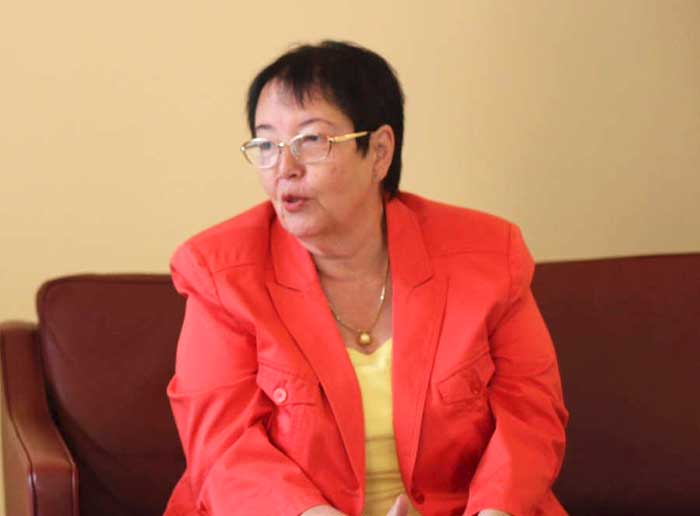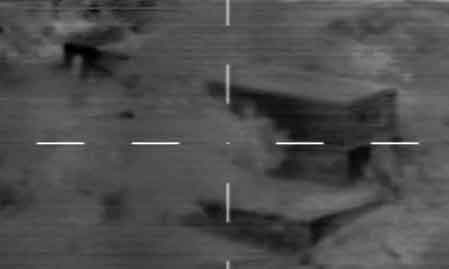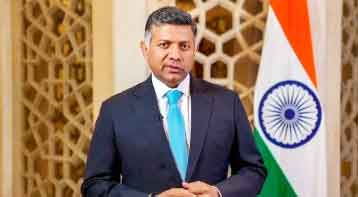On the eve of Netaji Subhas Chandra Bose's 126th birth anniversary, his daughter, Anita Bose Pfaff, issued a statement on Sunday re-stating her father's vision of India based on secular and socialist principles, and she also explained why he had to turn to fascist governments for help.
"Even though he died in a foreign country more than 77 years ago and his remains still rest in a foreign land, many of his countrymen and his countrywomen have not forgotten him," Pfaff noted in her statement.
"They remember him not only in a detached manner as a person who played a role in the struggle for India's independence," Pfaff said. "Members of all parties, across the entire political spectrum, parties who share his ideas and his ideology and those who do not, pay tribute to him and thank him for his sacrifice for India. With their respect and love they repay him for his sacrifice for their country."
With this preface, Pfaff went on to remind Indians that "Netaji should be remembered for what he stood for and envisaged for independent India". She then spelt out the four pillars of Netaji's Idea of India:
India was to become a modern state, respected by other countries. Education for all men and women was therefore of utmost importance to him.
He believed in equal rights, opportunities and duties for men and women, for members of all religions, castes and all social strata. This meant the empowerment and emancipation of all disadvantaged people.
As an individual he was a religious person. However, he wanted free India to be a secular state where members of all religions would live together peacefully and with mutual respect. These values were practised in the Indian National Army and in his own actions.
He was a politician inspired by socialism who envisioned India to become a modern, socialist -- or in today's terms social-democratic -- state, with equal opportunities for the well-being of all.
"In his struggle for India's independence he saw himself forced to seek the cooperation and support of fascist countries who did not share his ideology and his political agenda," Pfaff clarified. "At that time, they were the only countries willing to support this struggle against a common adversary."
Reiterating her demand that Netaji's ashes be brought back home from Tokyo's Renkoji Temple, Pfaff said: "Men and women who love and admire Netaji can honour him best by upholding his values in their political and personal actions -- and by welcoming his remains back in India. Let us bring Netaji's remains back home!"






Army releases video of India destroying Pakistani military post
The Indian Army has released the first video of a strike carried out at a Pakistani military post, responding to the cross-border firing by Islamabad troops in the face of escalating tension between the two countries.
Pakistan attacked with multiple missiles and drones, all effectively repulsed: Indian Army
Pakistan Armed Forces launched multiple attacks using drones and other munitions along the entire Western border on the intervening night of May 8 and May 9, Indian Army officials said.
Indian envoy to UK slams Pakistan Army for giving state funerals to terrorists
Vikram Doraiswami, the Indian High Commissioner to the UK, has hit out at Pakistan's Army for giving state funerals to proscribed terrorists, adding that India will respond in kind if Pakistan chooses to retaliate.
24 airports shut, airlines issue travel advisories amid tensions between India-Pakistan
The Civil Aviation Ministry has said that 24 airports across the country have been temporarily closed for civil flight operations as of Thursday evening amid escalating tensions between India and Pakistan, which soared further after a Pakistani drone and missile attack on Indian cities in Jammu, Punjab, Gujarat and Rajasthan.
India to present its case today before IMF to review bailout package to Pakistan
India will put forward the country's position at a board meeting of the International Monetary Fund in Washington on Friday, Foreign Secretary Vikram Misri said in response to a query on New Delhi asking for a review of loans to Pakistan.
India-Pakistan conflict is 'none of our business', says US Vice-President Vance
US Vice-President J.D. Vance has said that the conflict between India and Pakistan is "fundamentally none of our business," though he and President Donald Trump are encouraging both the countries to de-escalate.
BSF foils infiltration bid in J&K's Samba, heavy mortar shelling continues by Pakistan
After its drones and low range missiles fired to target defence installations were neutralised by the alert troops in Jammu, Samba, R.S. Pura and other places, terrorists aided by Pakistan troops made an unsuccessful infiltration attempt in Jammu and Kashmir's Samba district on the International Border.